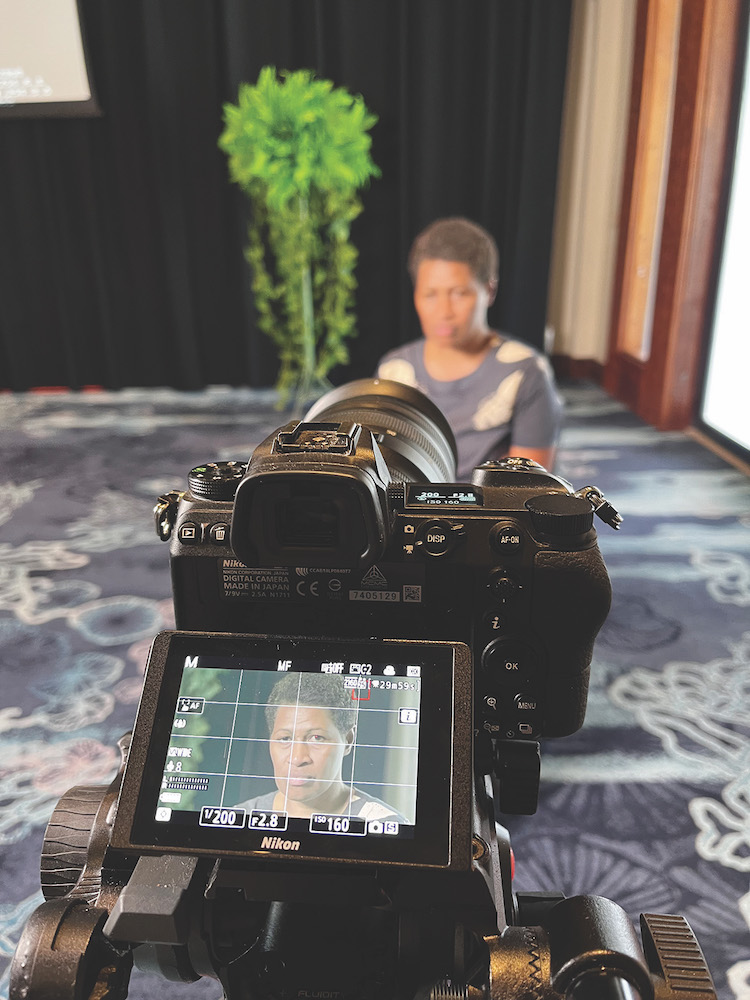A Feminist Approach to Disaster Response

A crumbling sea-worn headstone, half-submerged in dark sand: This is all that’s left of a burial site in Togoru, Fiji. It’s a haunting symbol of the devastating question this and many other communities must face: How do you preserve a people, a memory, and a culture displaced from their land?
Traditional disaster response isn’t built to answer these kinds of questions. In 2015 and 2016, two massive cyclones struck the Pacific Islands. Sharon Bhagwan Rolls, a second-generation Pacific Island feminist and technical advisor of the Pacific Island Feminist Alliance for Climate Justice (PIFA4CJ), housed within the Shifting the Power Coalition, recalls the aid and humanitarian response from the Global North in the wake of those cyclones: Top-down and male-led.
The result? In Togoru, women received a surplus of water tanks, when what they really needed were rocks to build a seawall.
“For many reasons Pacific Island communities are underrepresented in decision-making processes. That includes women in local communities who have the traditional knowledge and recommendations,” Bhagwan Rolls says.
Weaving Alliances
Founded in 2016, the Shifting the Power Coalition is now also the Secretariat of the Pacific Island Feminist Alliance for Climate Justice (PIFA4CJ) which further disrupts the traditional top-down, one-time-funding models of humanitarian aid. The purpose is to shift the power between “donor” and “recipient” for Pacific Island women to determine resourcing priorities.
“This is feminist funding – not the traditional donor mentality of, ‘We’re going to hover over you,’” Bhagwan Rolls says. “It demonstrates trust and allows you to adapt.”
In the Pacific Islands, adaptability is essential as ever-increasing, ever-mighty cyclones are threatening homes, families, culture, and heritage. To the Pacific Island Feminist Alliance for Climate Justice, the climate crisis offers an opportunity to reimagine a more resilient response model to long-term, unpredictable change.
“Climate change is not a project,” Bhagwan Rolls says. “Within the climate justice agenda, you have so many intersectional issues: the impact on women’s health, loss and damage, cultural identity, and so much more.”
Weathering Storms Ahead
2023 brought more cyclones. But that year, women were leading a more intersectional response. They built seawalls, helped disabled women lead their communities’ need assessments and aid distributions, and young women brought each other reproductive health resources.
“Sure, you can still provide a water tank,” Bhagwan Rolls says. “But you also can have a conversation with one of our partners from the community, talking about how this affects women’s health, reproductive rights, future access to water, and climate change. That’s transformative.”
The era of climate change inevitably magnifies inequities. Though the Global North is responsible for 50% of greenhouse gas emissions, the reality of loss and damage and relocation is an issue now for Pacific Island communities, who are some of the lowest contributors to emissions globally. (Note: not everyone will be a refugee; most relocation plans start with a national or local option.)
“The political conversations are a lot better now, rather than simply being about disaster, response, recovery, and the next stage,” Bhagwan Rolls says. “It’s really about feminist climate justice for Pacific Island women as we know it, as we live it, here.”
Pacific Island Feminist Alliance for Climate Justice
Donate now!facebook.com/PIFA4CJ
(+679) 765-9978
Coordinator PIFA4CJ: Alisia Evans
Mission
A Feminist approach to disaster response with a purpose to shift the power between “donor” and “recipient” for Pacific Island women to determine resourcing priorities.
Begin to Build a Relationship
We know you care about where your money goes and how it is used. Connect with this organization’s leadership in order to begin to build this important relationship. Your email will be sent directly to this organization’s director of development and/or Executive Director.